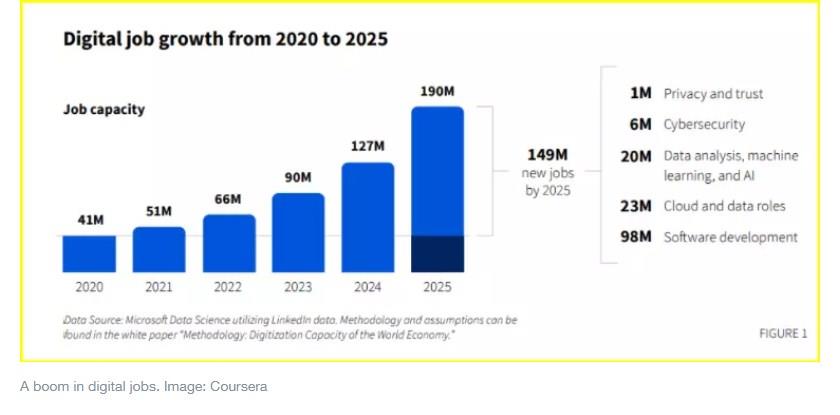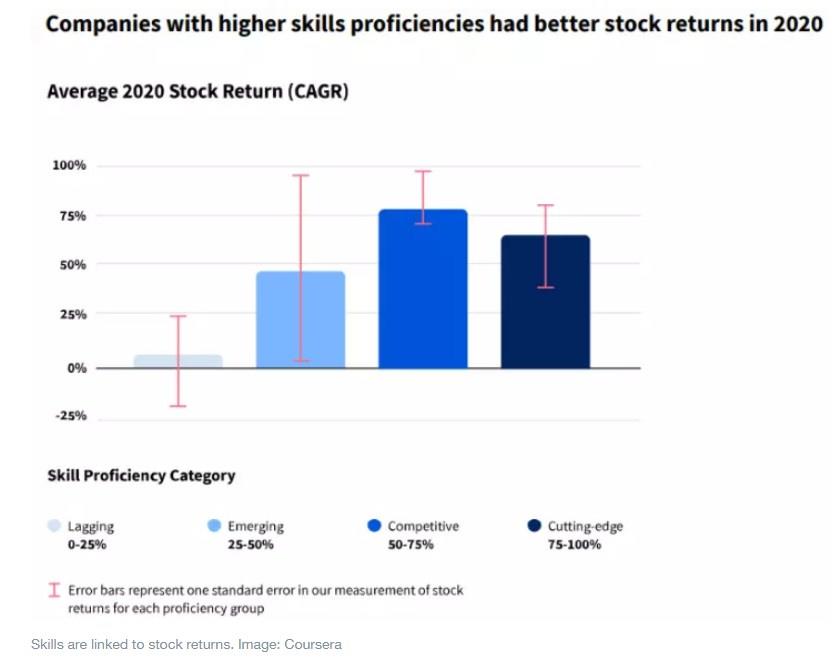by Kayleigh Bateman*
Every single job of the future will have a digital element - so how are companies adapting the skills within their workforces? And are they doing it fast enough?
The pandemic has accelerated the rate of digitization on a global scale, according to the 2021 Industry Skills report from online learning platform Coursera, citing Microsoft data that shows two years’ worth of transformation occurred in just two months. Since the progress that’s been made is unlikely to be undone, the risk is that the pandemic also exacerbates gaps in digital skills across a range of sectors.
Upskilling current workforces is key, according to Coursera’s report, with critical skills including cloud computing, cybersecurity, data analysis and software development. By 2025 there will be 149 million new digital jobs in areas like privacy and trust, cybersecurity, data analysis, machine learning and AI, cloud and data roles, and software development, according to Microsoft Data Science.

The findings echo the World Economic Forum’s Future of Jobs report, which found a renewed urgency for companies and policy makers to take proactive measures to ease the transition of workers into the digital future and to prevent an exacerbation of inequalities.
Coursera’s report gives new insight since it includes data from 40 million learners registered on the platform and analyzes their proficiency across 10 industries.
So, what did the 2021 data reveal?
1. Employee skills and share price performance are linked
Through 2020, while the COVID-19 pandemic shuttered large swathes of the economy and forced many businesses to change the ways they operated, companies that had “cutting edge” skills proficiencies saw better stock returns, than those with “lagging” proficiencies.
“Overall, in this volatile year, the companies that have been better able to weather the disruption of the pandemic are the same companies that are investing in their employees’ skills,” the report says.

2. Upskilling boosts employee confidence
Learners who gain at least one competitive proficiency in at least one new skill feel more confident at work, according to the survey’s analysis of “learner outcomes.”
Furthermore, enrollments in personal development courses on the Coursera platform jumped to 5.5% in 2020 from 3.1% in 2019.
“As people adjust to the pandemic, the trend is reversing but we are intrigued at the investment learners made to master positive psychology and grit,” the report notes.
3. The automotive sector is improving, but needs to up the pace
The automotive industry is making progress in areas like autonomous vehicles, electric-car batteries and connected cars, but needs to do more.
To keep up with the current pace of change, companies need to strengthen development in several critical skills including cloud computing, security engineering and data visualization, that are “lagging,” the report says.
“More than half of respondents to an automotive talent survey are not confident their organizations have access to the talent needed to fill the jobs of tomorrow,” it says. “To close this skills gap, automotive companies need to build those skills in their own employee base— instead of relying on attracting them externally.”
4. Manufacturing is improving in several “cutting edge” areas
As the manufacturing industry increases its adoption of “smart” technologies like robotics, companies are demonstrating “cutting edge” skills in strategy and operations, software engineering and data visualization.
Despite this, a skills gap and a labour shortage in manufacturing is still a long way from being resolved and companies need to strengthen their proficiency in “emerging” areas such as cloud computing, statistical programming and probability and statistics.
5. Skills gap cited as a risk to growth by the financial services industry
By 2025, the financial industry is expected to create 14 million new digital jobs, the report shows as legacy financial systems are replaced with cloud technology and financial services processes, like auditing, are digitally transformed.
While these jobs will require skills like software development, data analysis, machine learning, AI, and cybersecurity, nearly 75% of financial services executives say there is either a moderate or significant skills gap at their company, which is a risk to growth.
The report stresses that financial companies will need to continue to adjust their business strategies to remain competitive in a rapidly changing market and recommends that companies improve on skills such as strategy and operations and leadership and management.
6. Professional services are investing in virtual technologies
The professional services industry is investing in virtual processes to make up for decreased in-person interactions. The report noted that companies in this sector are developing “cutting edge” skills and technologies in communication, leadership and management and marketing to ensure relationships can thrive.
7. Technology companies are working to keep up with the rapid pace of innovation
The technology industry is working to address the short shelf-life of its skills with more development in “cutting edge” technologies, according to the report, such as cloud computing, software engineering and data management.
However, it stresses that companies in this sector must also improve their critical business skills in areas such as human resources, finance and marketing.
8. Telecommunications industry looking to maximize 5G growth opportunities
To maximize the opportunity for growth that is available surrounding 5G, companies are developing skills in computer networking, security engineering, and cloud computing.
According to the report, companies in this sector are anticipating the data implications of the shift to 5G and are looking to improve skills in data analysis, data visualization and machine learning to maintain a competitive advantage.
Overall, the report shows how the twin forces of digital transformation and the pandemic are combining to reshape our working landscape. With COVID-19 continuing to present challenges to businesses as we enter 2022, companies will have to continue to find new ways to reskill and upskill their workers to increase innovation and keep hold of their competitive advantage.
*Senior Writer, Formative Content
**first published in: www.weforum.org




 By: N. Peter Kramer
By: N. Peter Kramer
